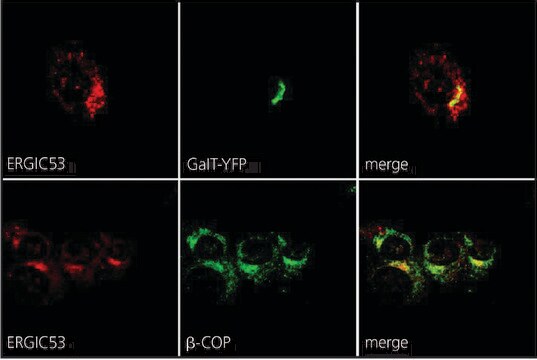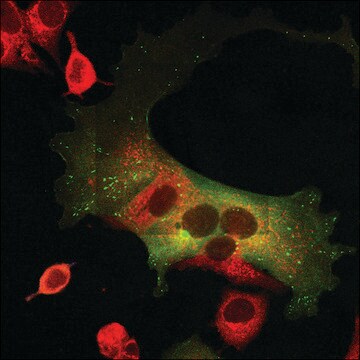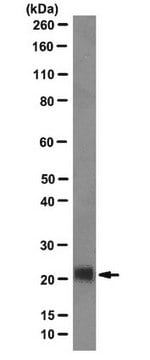Wichtige Dokumente
SAB4200585
Anti-ERGIC-53 antibody, Mouse monoclonal
clone ERGIC-3, purified from hybridoma cell culture
Synonym(e):
Monoclonal Anti-ER-Golgi intermediate compartment 53 kDa protein, Monoclonal Anti-ERGIC-53 antibody produced in mouse, Monoclonal Anti-ERGIC53, Monoclonal Anti-F5F8D, Monoclonal Anti-Gp58, Monoclonal Anti-Intracellular mannose-specific lectin MR60, Monoclonal Anti-LMAN1, Monoclonal Anti-Lectin mannose-binding 1
About This Item
Empfohlene Produkte
Biologische Quelle
mouse
Qualitätsniveau
Konjugat
unconjugated
Antikörperform
purified from hybridoma cell culture
Antikörper-Produkttyp
primary antibodies
Klon
ERGIC-3, monoclonal
Form
buffered aqueous solution
Mol-Gew.
antigen ~58 kDa
Speziesreaktivität
mouse, human, rat
Konzentration
~1 mg/mL
Methode(n)
immunoblotting: 1-2 μg/mL using whole extracts of human HeLa cells.
Isotyp
IgG1
UniProt-Hinterlegungsnummer
Versandbedingung
dry ice
Lagertemp.
−20°C
Posttranslationale Modifikation Target
unmodified
Angaben zum Gen
human ... LMAN1(3998)
mouse ... Lman1(70361)
rat ... Lman1(116666)
Allgemeine Beschreibung
Immunogen
Biochem./physiol. Wirkung
Physikalische Form
Haftungsausschluss
Sie haben nicht das passende Produkt gefunden?
Probieren Sie unser Produkt-Auswahlhilfe. aus.
Lagerklassenschlüssel
10 - Combustible liquids
Flammpunkt (°F)
Not applicable
Flammpunkt (°C)
Not applicable
Analysenzertifikate (COA)
Suchen Sie nach Analysenzertifikate (COA), indem Sie die Lot-/Chargennummer des Produkts eingeben. Lot- und Chargennummern sind auf dem Produktetikett hinter den Wörtern ‘Lot’ oder ‘Batch’ (Lot oder Charge) zu finden.
Besitzen Sie dieses Produkt bereits?
In der Dokumentenbibliothek finden Sie die Dokumentation zu den Produkten, die Sie kürzlich erworben haben.
Unser Team von Wissenschaftlern verfügt über Erfahrung in allen Forschungsbereichen einschließlich Life Science, Materialwissenschaften, chemischer Synthese, Chromatographie, Analytik und vielen mehr..
Setzen Sie sich mit dem technischen Dienst in Verbindung.








